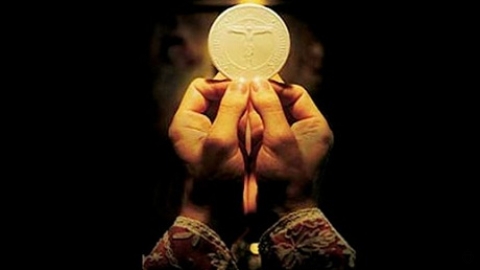Without Idolatrous Intentions?
“Good afternoon, I would like to say a word about the pachamama statues that were removed from the Church at Traspontina, which were there without idolatrous intentions and were thrown into the Tiber. First of all, this happened in Rome and, as bishop of the diocese, I ask pardon of the people who were offended by this act.” This was how Francis, as Bishop of Rome—and therefore as Pope—expressed himself in the wake of the disappearance of five wooden statuettes from the church of Santa Maria in Traspontina.
On Sunday, October 21, Alexander Tschugguel, a young Austrian visiting Rome, did indeed remove these idols exposed in a chapel since the beginning of the Synod on the Amazon, and threw them into the river.
Idols Publicly Honored
Representing completely naked women, kneeling and pregnant, their faces sad and made up, their identity had been debated since October 4—on the feast of St. Francis of Assisi—where they appeared paraded in procession before the pope and cardinals in the Vatican gardens.
That day, a procession of laymen and religious had circled around a colorful tablecloth where had been spread diverse and varied objects: oars, a dugout canoe, fishing nets, samples of earth and grains, incense, a phallic figurine, seashells ... and two of these statuettes depicting fertility. After a few songs, everyone knelt and prostrated themselves in adoration before these disparate and suspicious objects. Later, a similar procession took place in the church of Santa Maria in Traspontina, as well as in St. Peter’s Basilica where the canoe appeared, as well as in the Paul VI hall and in the synod hall.
By clearly recognizing that these were representations of the Pachamama, an idol worshiped by the Incas and whose worship is still alive in the Andean countries, the pope dispelled the mystery surrounding the identity of these figurines. It was indeed before these statuettes representing a pagan deity that Catholics had prostrated themselves, in the Vatican gardens as well as in the church of Santa Maria in Traspontina. It was in their company that Amazonian rites have been celebrated in enculturated liturgies. It was they who were exhibited in chapels, carried in processions, and installed in a place of honor in the synod hall.
Where Are The Confessors of The Faith?
The Vicar of Christ seemed to want to brush aside the discomfort these events have aroused—they were committed “without idolatrous intentions,” he says. Very well then. Are we to understand that the laymen and religious who prostrated themselves on two knees before these wooden idols were just pretending, playing a role, acting?
Imagine the first Christians sacrificing to idols, depositing the grain of incense before Caesar or mingling with the pagan sacrifices then, to defend themselves, explaining that they acted “without idolatrous intentions”? They religiously kept the grave warning of Saint Paul: “Wherefore, my dearly beloved, fly from the service of idols” (1Cor.10:14), and would never have perjured themselves.
A previous article has shown how the veneration of the Pachamama statues was objectively an idolatrous act. “The searcher of hearts and reins is God,” (Ps.7:10) but the acts relate to the persons who pose them. “Be not deceived, God is not mocked” (Gal. 6:7). The true witnesses of faith shed their blood rather than simulate actions contrary to the first commandment of God: “The Lord thy God shalt thou adore, and him only shalt thou serve” (Mt. 4:10). It is in their wake that we must walk, strong in the faith, and constant in trial, keeping ourselves from idols.
Saint John, the Apostle of Charity
“Whosoever believeth that Jesus is the Christ, is born of God. And every one that loveth him who begot, loveth him also who is born of him. In this we know that we love the children of God: when we love God, and keep his commandments. For this is the charity of God, that we keep his commandments: and his commandments are not heavy. For whatsoever is born of God, overcometh the world: and this is the victory which overcometh the world, our faith.” (1 Jn. 5:1-4).
“We know that whosoever is born of God, sinneth not: but the generation of God preserveth him, and the wicked one toucheth him not. We know that we are of God, and the whole world is seated in wickedness. And we know that the Son of God is come: and he hath given us understanding that we may know the true God, and may be in his true Son. This is the true God and life eternal.” (1 Jn. 5:18-20).
“Little children, keep yourselves from idols.” (1 Jn. 5:21)
(Source : FSSPX - FSSPX.Actualités - 07/11/2019)


